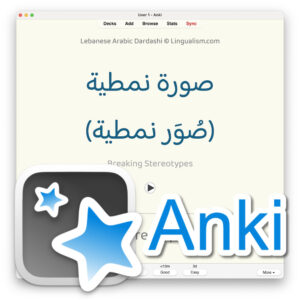Table of Contents
Levantine Colloquial Arabic is a spoken dialect with no official status or rules of orthography. Native speakers tend to borrow spelling conventions from Modern Standard Arabic with some accommodations to account for LCA pronunciation. Arabic script, however, is ill-suited to show the actual pronunciation of LCA and the sound changes that occur when words are inflected. Even if you are comfortable with Arabic script, it is advised that you pay close attention to the phonetic transliteration to determine a more precise pronunciation of words and phrases. IPA (International Phonetic Alphabet) symbols are found in [square brackets] in the descriptions below. You may find exceptions to the following rules, especially when it comes to words borrowed from other languages.
CONSONANTS
| The following sounds are also found in English and should pose no difficulties: | |||
| examples | |||
| b | ب | [b] as in bed | bána بَنى (build) |
| d | د | [d̪] as in dog, but with the tongue touching the back of the upper teeth | dáris دَرِس (study) |
| f | ف | [f] as in four | fētūra فاتورَة (bill) |
| j | ج | [j] as in pleasure and beige | jísim جِسِم (body) |
| h | ه | [h] as in house | hājam هاَجم (attack) |
| k | ك | [k] as in kid | ákal اَكَل (eat) |
| l | ل | [l] a light l as in love | líbis لِبِس (get dressed) |
| m | م | [m] as in moon | mēt مات (die) |
| n | ن | [n] as in nice | nísi نِسي (forget) |
| p | ب | [p] appears in some foreign borrowings | spōr سْبور (sport) |
| s | س ث | [s] as in sun | síni سِنِة (year) |
| š | ش | [ʃ] as in show | šū شو (what) |
| t | ت | [t̪] as in tie, but with the tongue touching the back of the upper teeth | tlēti تلْاَتِة (three) |
| ŧ | ث | [θ] as in think; this pronunciation found in Standard Arabic is an ‘educated’ variant of ث pronounced as [s], used in certain words. | náŧir نَثِر (prose) |
| v | ف | [v] appears in some foreign borrowings | mūvī موفي (movie) |
| w | و | [w] as in word | wēn وَيْن (where) |
| y | ي | [j] as in yes | yíktub يِكْتُب (he writes) |
| z | ز ذ | [z] as in zoo | zār زار (visit) |
The following sounds have no equivalent in English and require special attention. However, some exist in other languages you may be familiar with. | |||
| r | ر | [ɾ] tapped (flapped) as in the Spanish cara, or the Scottish pronunciation of tree | ráma رَمى (throw) |
| ɣ | غ | [ɣ] very similar to a guttural r as in the French Paris, or the German rot | ɣēr غَيْر (different) |
| x | خ | [x] as in the German doch, Spanish rojo, or Scottish loch | áxad اَخَد (take) |
| q | ق | [q] like k but further back, almost in the throat, with the tongue touching the uvula | qanāt قَناة (channel) |
| ɧ | ح | [ħ] like a strong, breathy h, as if you were trying to fog up a window | yíɧfur يِحْفُر (he digs) |
| 3 | ع | [ʕ] a voiced glottal stop, as if you had opened your mouth under water and constricted your throat to prevent choking and then released the constriction with a sigh | 3írif عِرِف (know) |
| ʔ | ء ق | [ʔ] an unvoiced glottal stop, as [ʕ] above, but with a wispy, unvoiced sigh; or more simply put, like the con-striction separating the vowels in uh-oh | ʔíbil قِبِل (accept) |
| The following sounds also have no equivalent in English but are emphatic versions of otherwise familiar sounds. An emphatic consonant is produced by pulling the tongue back toward the pharynx (throat), spreading the sides of the tongue wide as if you wanted to bite down on both sides of your tongue, and producing a good puff of air from the lungs. | |||
| ɖ | ض | [dˁ] emphatic d | ɖárab ضَرَب (hit) |
| ʂ | ص | [sˁ] emphatic s | ʂúbuɧ صُبُح (morning) |
| ʈ | ط | [tˁ] emphatic t | ʈálab طَلَب (ask) |
| ʐ | ظ | [zˁ] emphatic z | būʐa بوظَة (ice cream) |
VOWELS
| In LCA, vowels have some fluidity to their quality—their pronunciation is affected by neighboring consonants. The phonemic transcription offers an approximation based on the Arabic script. However, you should rely on the audio tracks to mimic a more precise pronunciation. Foreign words, in particular, may deviate from the rules below. Final vowels may be marked as long, but in reality, are often pronounced somewhat shorter. | |||
| examples | |||
| a | ـَ | The most versatile of the vowels, amay be pronounced a number of ways, most commonly [æ] as in cat (but with the jaw not quite as lowered as in English); sometimes [ɛ] as in bed, but sometimes more open, as the French é [e]; [a] as in stock when in the same syllable with ɧ or 3; usually [ɑ] as in father (but shorter) when in the same word as q, ɖ, ʂ, ʈ, ʐ, or, in most cases, r | kátab كَتَب (write) ɧaʈʈ حَطّ (put) ma3 مَع (with) ɖárab ضرب (hit) áʂɣar اَصْغَر (younger) |
| ā | ـَا | [æ:] / [a:] / [ɑ:] as with a above but longer | maqāl مَقال (article) |
| ã | ـان | [ɑ̃] (nasal) as in the French écran | ēkrã اَيْكْرون (sunscreen) |
| e | ـَ ـِ | [ɛ] as in bed, found in some foreign words. | esprésso اَسْبْرَسّو (espresso) |
| ē | ـَي | [e:] as in play (but without the glide to [j]) | wēn وَيْن(where) nēm نام (sleep) |
| i | ـِ | [ɪ] as in kid; [ɛ] as in bed when in the same syllable with ɧ or 3; when in the same word as q, ɖ, ʂ, ʈ, or ʐ, [ɨ] with the tongue pulled back a bit | 3ílim عِلِم (science) šíliɧ شِلِح (undress) ɖidd ضِدّ (against) |
| ī | ـِي | [i:] as in ski; [ɛ:] and [ɨ:] as with i above (but longer) | fī في (there is) ybī3 يْبيع (he sells) ʂʂīn الصّين (China |
| o | ـُ | [o] as in know (but shorter and without the glide to [w]) | doktōr دُكْتوْر (doctor) |
| ō | ـَو | [o:] as with o above but longer | nōm نوْم (sleep) |
| u | ـُ | [ʊ] as in book | yíʈlub يِطْلُب (he orders) |
| ū | ـُو | [u:] as in moon | šū شو (what) |







